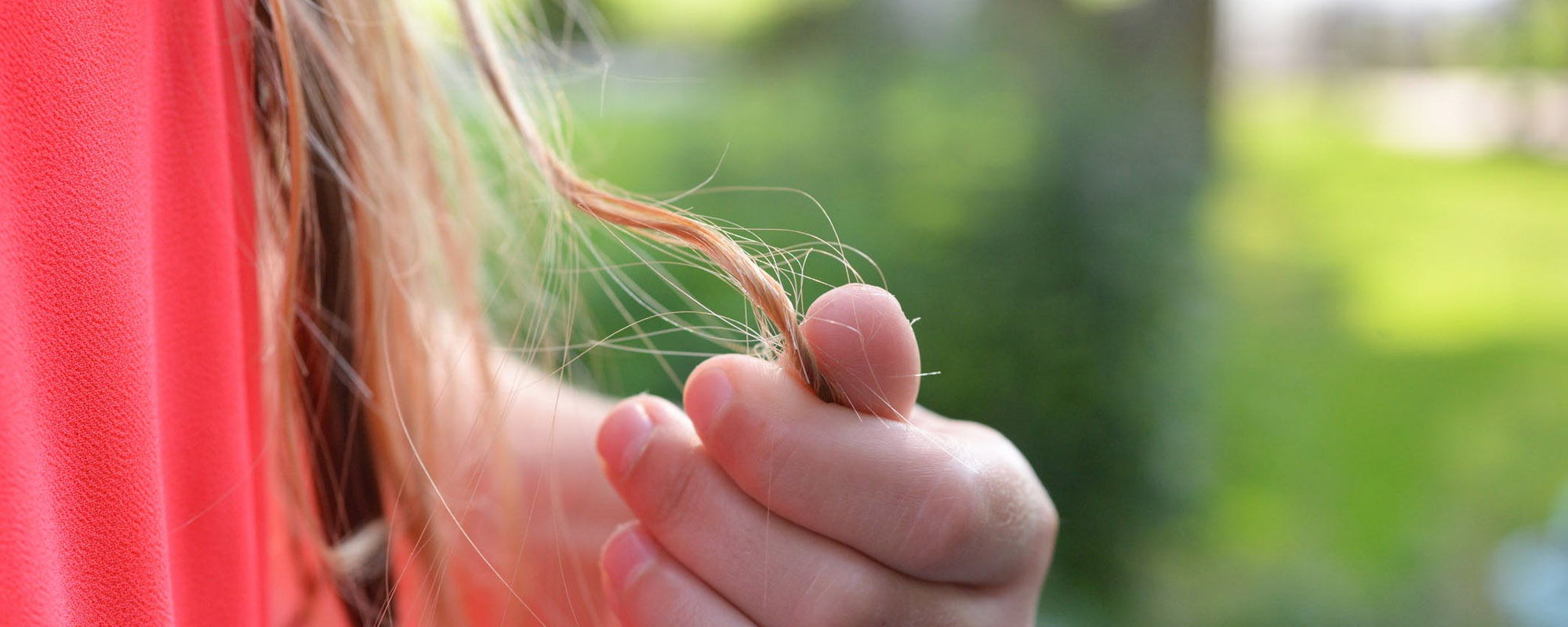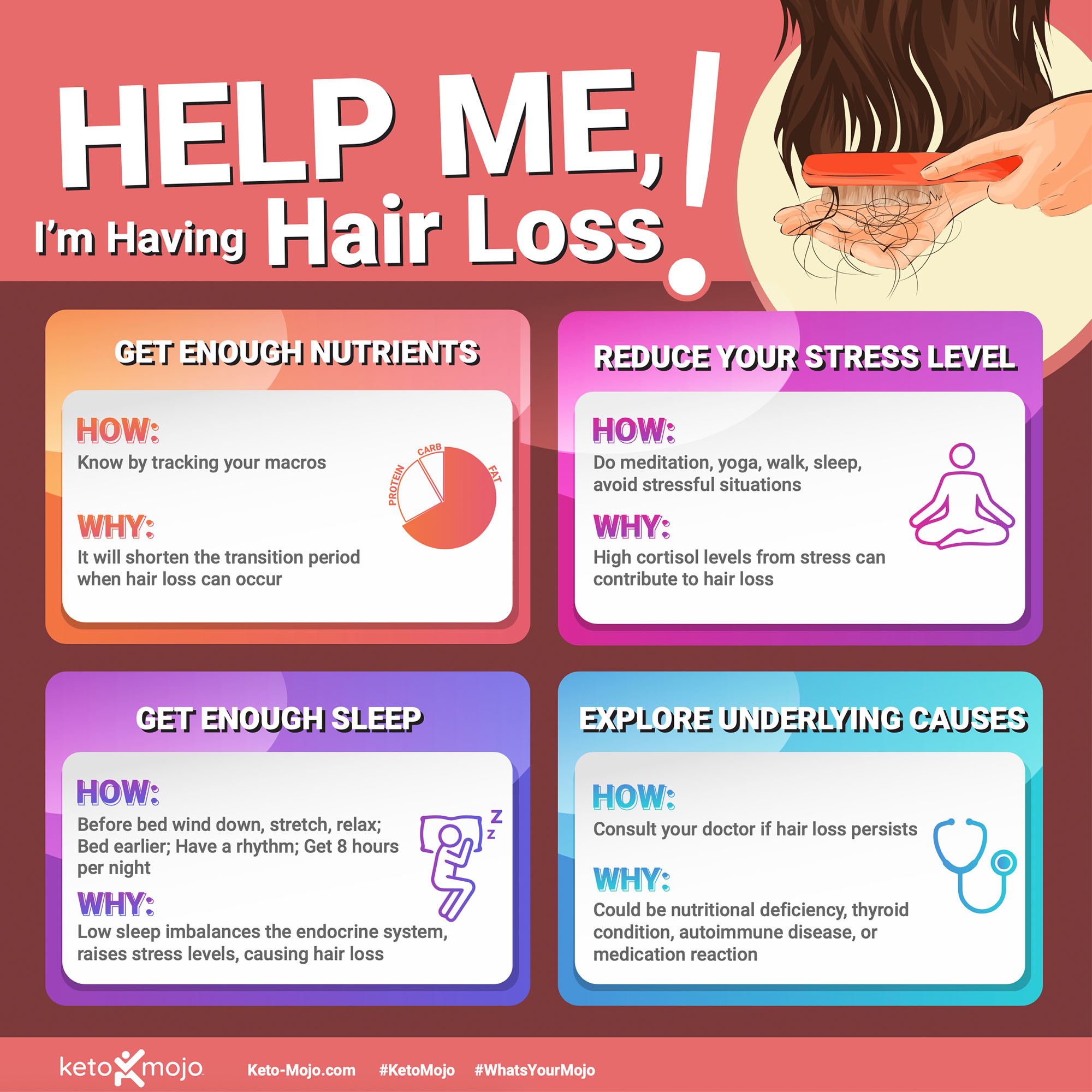When transitioning to a ketogenic diet, some people experience a number of side-effects, including hair loss. While unnerving, here’s the bottom line: keto hair loss is temporary. It’a a short-lived side effect that usually happens within the first half year of starting the new diet. Over time, it will go away and your hair follicles will begin to grow new, healthy hair.
While this fact doesn’t make the experience any more pleasant, it should reassure you that if you are losing hair, it won’t continue for the long term, and is likely one of the lesser-known symptoms of the “keto flu” (other symptoms include less energy, headache, body cramps, and more). Meanwhile, you can read on to learn some other reasons why you might be experiencing hair loss as well as some actions you can take to support hair growth during keto’s transitional period and beyond.
What causes hair loss while transitioning on a keto diet?
As with any major diet shift, whether weight-loss related or otherwise, you may experience a temporary period of thinning hair or hair falling out (typically three to six months after starting keto). This is similar to the hair loss from hormonal shifts that occur a few months after pregnancy or making other major dietary changes. Big changes impact your hormones, and it takes time for your body to adjust.
What are some other causes of hair loss?
There are other causes of hair loss outside of keto. For example, your hair does have its own unique natural growth and shedding process; everyone’s hair grows, falls out, and has new hair growth, at different rates. Contrary to what your hairdresser may have told you, hair loss is not based on a specific cycle or the seasons.
If your hair is shedding more than usual and is thinning in certain areas, there are other reasons this could be happening, including:
- Thyroid disease
- Hormonal changes
- Life stress (physical and emotional)
- Medications
- Pregnancy and breastfeeding
- Nutrient deficiencies such as low iron, zinc, niacin, selenium, and fatty acids
- Autoimmune diseases
What you can do to stop hair loss on keto
Although hair loss on keto does not affect everyone, there are some actions you can take to help support the health of your hair while on keto.
Get enough nutrients
Keto is a low-carbohydrate, high-fat diet, so the key is definitely not starvation; calorie intake is important, even if you’re intermittent fasting. But not just any calories. You want to be sure to consume enough keto-friendly macronutrients (low-carb, moderate protein, and high-fat) to avoid nutritional deficiencies. Protein intake plays a key factor here. You want to consume enough protein, not too much or too little protein. Micronutrients are also important; the B vitamin biotin is responsible for the shiny, lush look of healthy hair, and a biotin deficiency can impact hair growth. An iron deficiency can also cause hair loss.
You can make sure your macros and micronutrients are up to snuff by tracking your macros (especially important when first starting out on keto). You may also want to take a multivitamin.
While eating to your macros may not stop you from losing some hair while transitioning from a high-carb diet to a high-fat, low-carb diet, it will help your body adjust faster, so you can get past the transition period and get back to your normal hair-growth cycle.
Reduce your stress level
Heightened cortisol (stress hormone) levels can contribute to temporary hair loss, whether you’re on a keto diet or not. To ensure stress isn’t adversely influencing your hair health or making your hair fall out, do the following:
- Minimize your stress level any way you can, including meditation, yoga, taking walks, getting enough sleep, and avoiding stressful situations as well as you can.
- Pick a time to start keto when you know you don’t have too many big stressors on your plate.
Get enough sleep
Prioritize your sleep; it’s when your body repairs itself. Today’s culture tends to de-prioritize rest, but it’s extremely important. Lack of sleep can affect the function of your endocrine (hormonal) system, meaning it raises stress hormones, which, among other things, may cause hair loss. To help ensure you get enough sleep, do the following:
- Wind down before bed with a hot bath, book, or even relaxing music.
- Take time to stretch and relax before bed so you can ease into sleep.
- Get to bed earlier (something we can all work toward).
- Go to bed at the same time each night so you can get into a rhythm.
- Give yourself eight hours per night to rest.
Explore underlying causes with your doctor
There may be other reasons you are losing hair, including rapid weight loss. If you’re just starting keto (within the first week or so) or have been in ketosis for a while and are still experiencing hair loss, consult with your doctor to find out if there are other causes, like a nutritional deficiency, thyroid condition, autoimmune disease, or medication you’re adversely reacting to.
The Final Word
If you’re losing hair on keto and are confident your experiencing hair loss is not due to other reasons, relax and ride out this transition period; soon you’ll have back your normal head of hair. In the meantime, remember to take steps to eat well, lower your stress, and get sleep and you’ll continue to reap the amazing benefits of keto. Bonus: that coconut oil you probably have since it’s recommended for keto cooking is also great for moisturizing your scalp and hair follicles!



